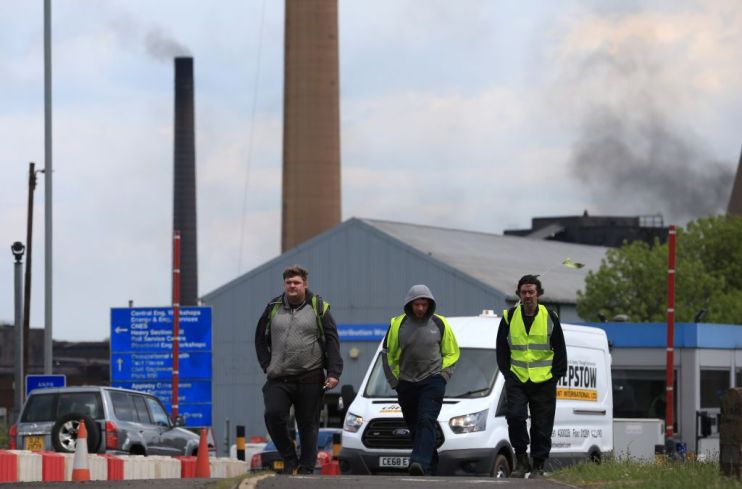Into the red: UK economy shrinks for first time in seven years

The UK economy contracted for the first time since 2012 in the second quarter of the year as the unwinding of Brexit stockpiling and global trade tensions damaged growth, official figures showed today.
UK GDP shrank by 0.2 per cent in the second quarter compared to the previous quarter, the Office for National Statistics (ONS) said. This was below expectations of zero growth and a first quarter expansion of 0.5 per cent.
Read more: Sterling to tumble further as no-deal Brexit worries intensify
Compared with the same quarter a year earlier GDP increased by 1.2 per cent, significantly lower than the 1.8 per cent seen in the first quarter. The figure undershot predictions of 1.4 per cent growth.
Sterling slipped against the dollar after the data was released. It had fallen 0.2 per cent to $1.212 by 10am UK time. The FTSE 100 stock index was also in the red but received a boost from the falling pound. It was 0.2 per cent lower at around 7,272.
The contraction was driven by a dramatic decline in manufacturing output after the stockpiling of goods around the original March Brexit date boosted demand and activity in the first quarter. Stockpiling helped the UK economy expand by 0.5 per cent in the first three months of 2019.
Carmakers bringing forward planned factory shutdowns to April to coincide with the original Brexit date also dragged down growth, the ONS said. The production sector shrank by 1.4 per cent overall in the second quarter.
“The construction sector also weakened after a buoyant beginning to the year, while the often-dominant service sector delivered virtually no growth at all,” said Rob Kent Smith, head of GDP at the ONS.
“The trade deficit narrowed markedly, as imports fell following a sharp rise in the first quarter ahead of the UK’s original departure date from the European Union.”
Read more: UK manufacturing sector records worst month in six years
Yet looking beyond Brexit-related volatility, underlying growth in the UK weakened, the statistics body said. The six-month on six-month growth rate slowed from one per cent in the second half of 2018 to 0.5 per cent in the first half of 2019.
The service sector provided the only positive contribution to GDP growth in the second quarter. But worryingly for Britain growth was marginal in the sector which makes up over 70 per cent of the UK economy.
Calls for emergency budget
Chancellor of the exchequer Sajid Javid said: “This is a challenging period across the global economy, with growth slowing in many countries.”
“But the fundamentals of the British economy are strong – wages are growing, employment is at a record high and we’re forecast to grow faster than Germany, Italy and Japan this year.”
“The government is determined to provide certainty to people and businesses on Brexit. That’s why we are clear that the UK is leaving the EU on 31 October.”
Tej Parikh, chief economist at the Institute of Directors (IoD), said: “Contraction in the second quarter is a rude awakening after the growth in the first three months of the year, and confirmation of the concerns businesses have been expressing about the economy.”
“Many firms have had to keep investment and recruitment decisions on ice, as the prospect of a disorderly Brexit becomes increasingly real.”
Business investment fell 0.5 per cent in the second quarter after an increase in the first quarter of the year. The recent agents’ summary from the Bank of England recorded the lowest investment intentions in nine years.
Martin McTague, policy and advocacy chairman at the Federation of Small Businesses (FSB), said: “Today’s figures clearly demonstrate the need for the chancellor to intervene with an emergency budget before Brexit happens.”
Read more: Property investment plummets in first half as Brexit uncertainty hampers market
New chancellor Javid is said to be mulling such a move, which could kickstart the economy and cushion the expected damage from a possible no-deal Brexit.
“If the Treasury delays action until after 31 October, its efforts will likely prove too little too late,” said McTague.
(Image credit: Getty)